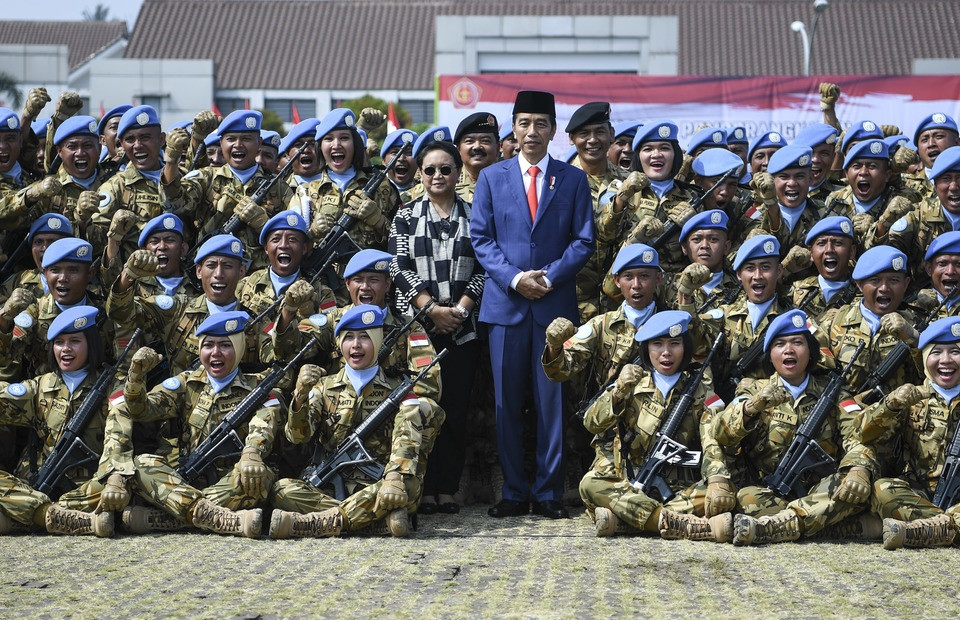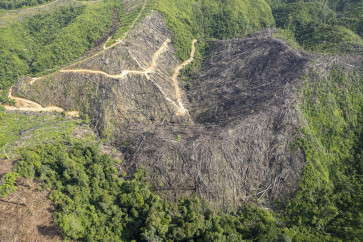Popular Reads
Top Results
Can't find what you're looking for?
View all search resultsPopular Reads
Top Results
Can't find what you're looking for?
View all search resultsWomen peace and security agenda progress in ASEAN Summit
Women’s active contribution to the ASEAN political and security pillar as part of the defense forces, security actors and peacemakers is often left behind.
Change text size
Gift Premium Articles
to Anyone
The Chairman’s Statement of the 42nd ASEAN Summit in Labuan Bajo recently noted good progress on the women, peace and security (WPS) agenda. It however left some questions, such as where is the locus of the progress, what should we expect from ASEAN next in this space and how can it coexist with other efforts to address the needs of the region?
The WPS agenda is a global effort to acknowledge women’s leadership and meaningful participation in creating and maintaining peace. It is implemented through the four pillars of participation, protection, prevention, as well as relief and recovery.
The WPS agenda is recognized universally for the first time by the adoption of United Nations Security Council Resolution (UNSCR) 1325 in 2000. It is implemented nationally and regionally by countries and regional organizations publishing their action plans. Within Southeast Asia, ASEAN issued its Joint Statement on WPS in 2017 and adopted its regional plan in 2022.
This year, the notable progress highlighted in the Chairman’s Statement is the ASEAN Defense Ministers’ Meeting (ADMM) and ADMM Plus have stated their commitment to advancing the WPS agenda in the male-dominated defense space. This follows last year’s Joint Declaration by the ADMM-Plus Defense Minister on Defense Cooperation to Strengthen Solidarity for a Harmonized Security that commits to strengthening women’s meaningful participation in peace and security cooperation.
This is important due to its novelty. As previously, to the extent of ASEAN’s experience, the issue of women is initially placed under social and community pillars. Whilst the discussion of women in ASEAN gradually brought into the economic pillar in the 1990s with the push for economic development, entrepreneurship and demand for protection of migrant workers, women then were more relegated as victims rather than empowered agents, as seen in the 2004 ASEAN Declaration Against Trafficking in Persons Especially Women and Children. Hence, women’s active contribution to the ASEAN political and security pillar as part of the defense forces, security actors and peacemakers is often left behind.
We can expect that going forward, more support for women’s leadership and their meaningful participation will be reflected in the practical defense cooperations between ASEAN member states and the organization’s dialogue partners of Australia, China, India, Japan, New Zealand, Republic of Korea, Russia and the United States. Areas of work include the seven Experts’ Working Group (EWG) of humanitarian assistance and disaster relief, peacekeeping operations, maritime security, counterterrorism, military medicine, humanitarian mine action and cybersecurity.
Different ASEAN partners may provide encouragement in their specific areas. For example, Japan, in line with its NAP and as a cochair of peacekeeping EWG until 2024, supports the increase of women’s participation in peacekeeping operations both in quantity and quality. Meanwhile, countries like Australia and the Republic of Korea further the study on WPS in cybersecurity. For capacity building, Canada in collaboration with the ASEAN Institute for Peace and Reconciliation (ASEAN-IPR) prepared modules and training programs tailored specifically for government officials, military personnel and police forces on WPS.
Despite its pace, it is admirable ASEAN has made strides in the adoption and implementation of WPS considering only three member states have issued National Action Plans (the Philippines, Indonesia and Timor-Leste). A study by Council for Security Cooperation in the Asia Pacific (CSCAP) on WPS noted although NAPs provide legal instruments for interagency cooperation, civil society participation, funding clarity, plan implementation and monitoring, its absence does not indicate lack of support for WPS.
Some countries, due to their preference for wider focus, concerns of domestic affairs scrutiny or limitations of existing legal language mechanisms, opt for a more holistic terminology to advance the WPS agenda. For example, Vietnam utilizes National Strategy on Gender Equality (2021-2030), Myanmar has National Strategic Plan for the Advancement of Women (2013-2022) and Thailand implements Measures and Guidelines on Women and the Promotion of Peace and Security (2017-2021).
That said, without member countries’ having NAPs, with constant commitment and adequate support, ASEAN may still be successful in implementing its ambitious Regional Plan of Action (RPA) that consists of six strategic outcomes, 20 outputs and 98 priority actions.
With that many goals, it is understandable ASEAN focuses more on reaching the low-hanging fruit on its to-do list, especially when its current chair Indonesia is distracted by its general election next year. Based on the Chairman’s Statement, near future action in the WPS space is to convene a High-Level Dialogue to strengthen women’s capacities as mediators; establish mechanisms to promote collaboration; and exchange practices to leverage women’s meaningful participation and contribution to conflict prevention, resolution and recovery.
Ticking boxes aside, it is important to remember WPS RPA does not proceed in a void. The region also pursues other plans of action, and it is crucial to seek synergy as resources are scarce and time, limited. The WPS intersections can be applied collaboratively with the ASEAN RPA on the Elimination of Violence against Women; ASEAN Regional Strategic Framework on Gender Mainstreaming; ASEAN Regional Framework on Protection, Gender and Inclusion in Disaster Management; ASEAN Plan of Action to Prevent and Counter the Rise of Radicalization and Violent Extremism and the ASEAN Vision 2025.
The challenge may lie in the bureaucracy, as there are different implementing bodies and corresponding ministries within ASEAN.
From a more philosophical perspective, the WPS itself intersects with other agendas, including the Youth, Peace and Security (YPS) and the empowerment of other minorities in all stages of peace processes. The question is whether ASEAN is ready to embrace minorities, be it gender, religious or ethnic minorities, as part of its collective identity to create and maintain inclusive peace.
***
The author is a research consultant at the International Relations Department, Centre for Strategic and International Studies (CSIS) Indonesia and cochair for Women, Peace and Security Study Group of the Council for Security Cooperation in the Asia Pacific (CSCAP)










